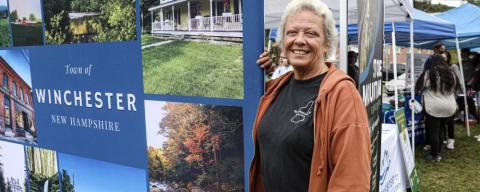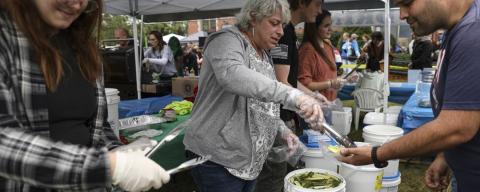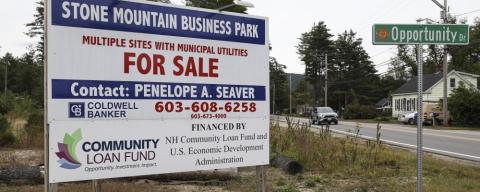What’s the Dill with Housing?
I learned about the festival from Evan O’Connor, the new Land Use Administrator for the Town of Winchester, New Hampshire. Evan attended Housing Academy and shared different engagement strategies the town was implementing: a survey, an event at a local brewery and, of course, the Pickle Festival. It was my first pickle festival, but definitely not my last.
I knew I was in the right place when traffic slowed down and people dressed all in green and decked out in pickle hats started to trickle down the sidewalk. It was massive!
In the center of things was a tent where festival attendees could get free pickle samples, courtesy of Winchester residents. I found the town’s housing engagement booth just on the other side of that long line of pickle lovers.
While Evan was busy exploring his first Pickle Festival, I connected with his predecessor, Margaret Sharra, and Jessica Wright-Moore from the Winchester Economic Development Corps. The two shared a booth, promoting the town’s housing survey, answering questions about the incoming Stone Mountain Business Park, and talking to residents about their favorite pickles.
The booth collaboration was no coincidence. Margaret and Jessica laughed a bit when I asked how their work overlapped – both work with the town, and both also volunteer with the Economic Development Corps.
They described public-private symbiosis and the strategy they’ve used to acquire funding that will help to promote more housing in town. Some grants they’d been eyeing were only available to municipalities, while others were only available to nonprofits. The two organizations collaborated so their applications would be complementary, bringing changes that worked in unison.
First, the town applied for funding to improve and extend municipal public water and sewer infrastructure. On the heels of a successful application, they built on that momentum by changing zoning in the newly supported parts of town to allow for duplexes.
On the other side of things, the Economic Development Corps applied for funding to help build Stone Mountain Business Park, which was now feasible because of the town’s improved infrastructure. Businesses were willing to come, but only if they knew workers would have access to housing and childcare, so the plan was adjusted to meet both of those needs. The Business Park project will bring in revenue to the town and job opportunities to the surrounding area, too.
Despite these successes, outreach and engagement has been more of a pickle. A forum at the school the Thursday before the festival was well-attended, but the majority of those who spoke were 45- to 60-year-old homeowners who intend to stay in their homes. It’s been more of a challenge to gather input from younger as well as older people or who are not happy with their current housing situation. How do you do that? Social media, direct invitations, networking, a snowballing strategy, sending more postcards, and hosting more events at the school targeted at parents, say the duo. And, as always, try new things, reassess, and try again.
“It's important to meet people where they’re at. This means listening to conversations that people are having about housing.”
Finally, Margaret offered some advice: the language you use is important. While Housing Academy promotes education about housing definitions and using data to inform citizen decision-making, Margaret had a different perspective. Because there are so many preconceptions around the language we use to describe workforce housing, she’s found it’s important to meet people where they’re at. This means listening to conversations that people have about housing, asking them what they mean, and learning the lingo in town. As long as there’s a shared understanding behind what we all mean when we say, “housing for families,” for instance, that can be enough to move forward with conversations about how to make sure we have a variety of housing choices for a variety of household types and income levels.
















